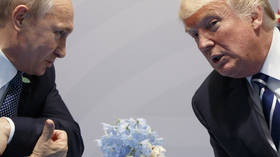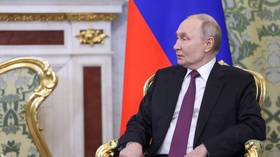‘Colonial rule ended in 1947!’ Indians lay into British MP & Kashmir policy critic who demanded instant visa for ‘private visit’
A British MP outraged that she was denied entry to India over a revoked visa has received a harsh backlash online, with some reminding the lawmaker – a critic of Delhi’s policies in Kashmir – that India is no longer a UK subject.
Debbie Abrahams, an MP who chairs the UK’s All-Party Parliamentary Group for Kashmir, was informed her visa had been rescinded after landing at an airport in New Delhi on Monday. Taking to Twitter after the incident, Abrahams demanded to know why she was barred entry, suggesting her vocal criticism of “human rights issues” in Kashmir motivated the move and insisting she was merely on a ‘private’ visit to see relatives.
Many on social media were not impressed by the display, however, with a number of Indian netizens sensing a whiff of “colonial hangover” in the lawmaker’s complaints.
Reminder The Colonial Rule ended on 15 August 1947. Never again shout at Indian Airports "I am Member of British House of Commons".Good Bye and don't you ever set foot on our soil again, you are "Persona Non Grata". https://t.co/6zEI3t99Un
— Howdy TRUMP (@Sootradhar) February 18, 2020
How presumptuous of her to travel on a cancelled visa! White superiority or colonial hangover?
— Invincible Spirit (@invinciblewife) February 18, 2020
“After 14th August 1947, entering into India ceased being a ‘right’ for the Brits,”wrote Yusuf Unjhawala, editor of the Indian Defence Forum.
One parliamentarian from the ruling BJP weighed in with a bit of travel advice for the MP, suggesting she ought to ensure her paperwork is valid prior to traveling to a foreign country.
Thats how all countrys work - even the UK. Valid Visas are the only way to enter a country even if ur a MP of another country. So next time the Rt Hon MP @Debbie_abrahams or anybody else shd try travelling ONLY AFTER ensuring she has a legit visa. https://t.co/UeYY4tUPRN
— Rajeev Chandrasekhar 🇮🇳 (@rajeev_mp) February 18, 2020
Who are you madam to interfere in our internal affairs...am glad you were not allowed to enter..Did you have a valid Visa?.. It is my Govt's prerogative whether to allow you in or not...Period https://t.co/BvM7NBTDMF
— radha raju (@radharaju18) February 17, 2020
While Abrahams maintains she had been granted a visa that was still valid when she left for Delhi, unnamed government sources cited by India Today said the credentials had been revoked, and that she was informed of this well in advance of her trip.
“The e-visa of the British MP was cancelled. She was informed of the revocation on Friday,” the sources said. “The status of her e-visa communicated to her clearly says 'rejected.'”
No, mam! You challenged the very article 370 which is none of your concerns. Needless meddling is not good, India knows how to deal with its internal issues.
— Dr. Munish Raizada (@DrMunishRaizada) February 17, 2020
Indian Embassy officials based in London also told the Times of India that all British MPs and diplomats must apply for a “proper visa” with the embassy, and that “to get an e-visa in her position was a violation of visa rules,” though it is not clear why she was granted one in the first place.
The controversy soon drew commentary from Pakistani President Arif Alvi, who accused rivals in New Delhi of attempting to “hide … atrocities” – presumably a reference to Kashmir, which was stripped of its autonomy status by India last summer, prompting complaints from Islamabad ever since. India has fiercely defended the move to integrate Kashmir into the rest of the country, however, arguing it was necessary in order to crack down on terrorism, ensure human rights and develop the region.
The world will find out despite India's attempt to hide its atrocities. India deports British MP @Debbie_abrahams who is known for highlighting Kashmir issue & also chairs – All Party Parliamentary Group for Kashmir (APPG) in the British Parliament. https://t.co/DRw3ruPRwshttps://t.co/G3VHaJXCnu
— Dr. Arif Alvi (@ArifAlvi) February 18, 2020
Both India and Pakistan maintain claims over Kashmir and the nuclear-armed neighbors fought two of their three wars over the territory.
Like this story? Share it with a friend!














